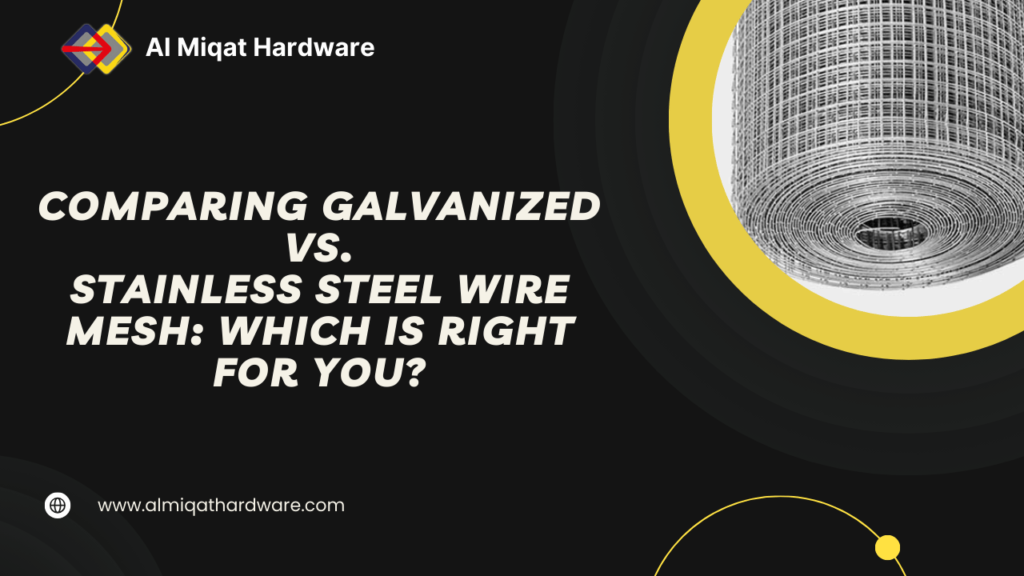Selecting the appropriate wire mesh is crucial for professionals in the construction and hardware industries. Two commonly used materials are galvanized and stainless steel wire mesh, each offering distinct advantages and limitations. This article provides a comprehensive comparison to assist B2B buyers in making informed decisions for their specific applications.
Understanding Galvanized Wire Mesh
What is Galvanized Wire Mesh?
Galvanized wire mesh is fabricated by welding low-carbon steel wires and subsequently coating them with zinc to enhance corrosion resistance. The galvanization process involves two primary methods:
- Hot-Dip Galvanizing: The welded mesh is submerged in molten zinc, resulting in a robust, thick coating.
- Electro-Galvanizing: An electrochemical process applies a thinner zinc layer, offering less corrosion resistance compared to hot-dip galvanizing.
Advantages of Galvanized Wire Mesh
- Cost-Effectiveness: Generally more affordable than stainless steel, making it suitable for budget-conscious projects.
- Adequate Corrosion Resistance: The zinc coating provides sufficient protection for many applications, especially in less aggressive environments.
- Versatility: Suitable for various general construction purposes, including fencing and enclosures.
Limitations of Galvanized Wire Mesh
- Limited Durability in Harsh Environments: In highly corrosive or marine settings, the zinc coating can deteriorate, leading to rust.
- Maintenance Requirements: May require periodic inspections and re-coating to maintain integrity.
- Aesthetic Considerations: Over time, galvanized mesh may develop a dull appearance, which might be undesirable for certain projects.
Understanding Stainless Steel Wire Mesh
What is Stainless Steel Wire Mesh?
Stainless steel wire mesh is composed of steel alloys containing chromium and nickel, which impart inherent corrosion resistance. Common grades include:
- 304 Stainless Steel: Offers good corrosion resistance and is suitable for general applications.
- 316 Stainless Steel: Contains molybdenum, providing enhanced resistance to corrosion, especially in marine environments.
Advantages of Stainless Steel Wire Mesh
- Superior Corrosion Resistance: Ideal for use in harsh and corrosive environments.
- High Strength and Durability: Capable of withstanding significant mechanical stress and high temperatures.
- Low Maintenance: Requires minimal upkeep due to its resistance to rust and staining.
- Aesthetic Appeal: Maintains a sleek, polished appearance, suitable for architectural applications.
Limitations of Stainless Steel Wire Mesh
- Higher Initial Cost: More expensive upfront compared to galvanized options.
- Weight Considerations: Heavier than galvanized mesh, which may impact installation and structural requirements.
Key Differences Between Galvanized and Stainless Steel Wire Mesh
Corrosion Resistance
- Galvanized: Provides moderate protection; the zinc coating can wear off over time, especially in aggressive environments.
- Stainless Steel: Offers exceptional corrosion resistance due to its alloy composition, making it suitable for prolonged exposure to corrosive elements.
Strength and Durability
- Galvanized: Adequate for standard applications but may not perform well under high stress or in extreme conditions.
- Stainless Steel: Exhibits superior strength and durability, suitable for demanding applications.
Cost Considerations
- Galvanized: Lower upfront cost; however, potential for higher maintenance and earlier replacement can increase long-term expenses.
- Stainless Steel: Higher initial investment but often more cost-effective over time due to its longevity and low maintenance requirements.
Aesthetic and Design Flexibility
- Galvanized: May develop a patina over time, which could be undesirable for visible applications.
- Stainless Steel: Maintains a consistent, attractive appearance, offering greater design flexibility for architectural projects.
Applications and Suitability
Galvanized Wire Mesh Applications
- Agricultural Fencing and Enclosures: Suitable for livestock containment and crop protection.
- General Construction: Used in reinforcing concrete, partitioning, and other structural applications.
- Temporary Barriers: Ideal for short-term use in events or construction sites.
Stainless Steel Wire Mesh Applications
- Architectural Facades and Decorative Installations: Used for its aesthetic appeal and durability.
- Marine and Coastal Infrastructure: Suitable for environments exposed to saltwater.
- Food Processing and Pharmaceutical Industries: Meets hygiene standards due to its corrosion resistance and ease of cleaning.
Making the Right Choice for Your Project
When selecting between galvanized and stainless steel wire mesh, consider the following factors:
- Environmental Conditions: Assess exposure to moisture, chemicals, and corrosive elements.
- Structural Requirements: Determine the necessary strength and load-bearing capacity.
- Budget Constraints: Balance initial costs with long-term maintenance and replacement expenses.
- Aesthetic Preferences: Consider the importance of appearance and design flexibility.
Conclusion
Choosing between galvanized and stainless steel wire mesh depends on specific project requirements, environmental conditions, and budget considerations. While galvanized mesh offers cost advantages for less demanding applications, stainless steel provides superior performance and longevity, particularly in challenging environments. Consulting with suppliers or engineers can help ensure the optimal selection for your project’s success.


